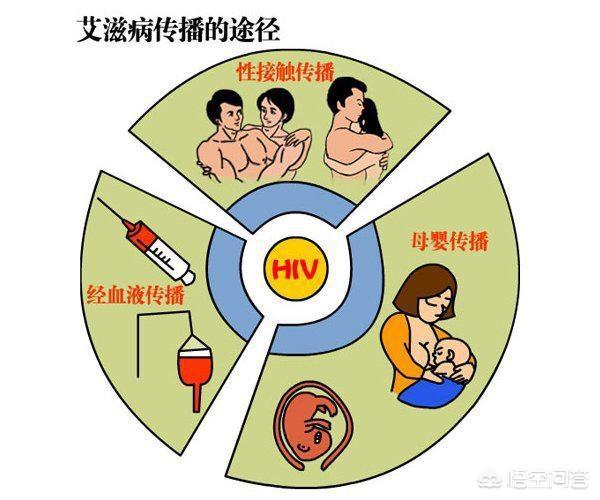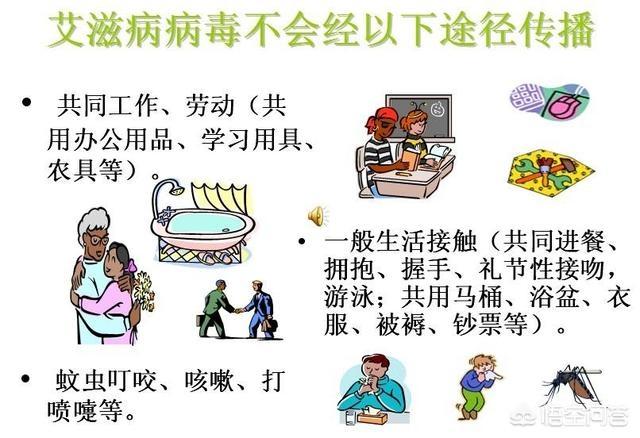Are there any cases in China or abroad where AIDS patients living with their families have infected their children?
Thank you for your invitation: in order to answer this question, I have specially checked the information on the Internet, and so far, there are no similar related reports at home and abroad. From my 12 years of experience in the field of AIDS prevention and treatment, I can see that there is a risk of being infected when living with AIDS patients!
In my work on AIDS prevention and treatment, I have witnessed two very special cases of HIV infection, neither of which could be traced to a clear route of transmission. In one case, a three-year-old boy, injured in a car accident, was found to be HIV-positive by a preoperative blood test; an epidemiological survey found that his parents were healthy and there was no possibility of mother-to-child transmission, but his grandparents, with whom he lived, were HIV-infected.
Another case was that of a female high school graduate found during the military examination who, after an epidemiological investigation, had no history of blood transfusion, no history of drug use, tattooing or cosmetic treatment, was of good character and academic excellence, and had been examined by a professional gynecologist who proved that she had no history of sexual intercourse, but that the cousin with whom she lived, a sex worker, was also infected with AIDS!
I only recognize the fact that untreated HIV-infected people are able to detect HIV in their saliva! In addition to the three well known ways of spreading AIDS, there may be other ways of spreading AIDS that are currently undiscovered! So I believe that there is a risk of being infected with AIDS by living with someone who has AIDS!
Hello, there is no such report, general daily life is not spread. Generally AIDS people's saliva has a small amount of virus, and there is oral mucous membrane protection, so the general kissing will not spread, there are paragraphs, if you want to kiss to spread AIDS, unless the kissing mouth broken blood flow. Coupled with the general use of medication, the infected person's body viral load is very low, basically there is no infectious, so "treatment is prevention".
Hi everyone, I am a doctor working on HIV at the CDC, and let me share my thoughts with you.
In my work, I have encountered many people who have been diagnosed, and their family members accompany them to the CDC to build a file for consultation. One of the most common questions asked by family members is what they need to pay attention to in their daily lives. After all, as AIDS is an infectious disease with a high mortality rate and a significant impact, everyone does not want to be infected, but in the face of a family member's diagnosis, they can't detach themselves from their family ties, so they inquire about what they need to pay attention to in their daily lives.
Of course, we also encountered some elderly people were diagnosed, because the grandchildren are only a few months to a few years old, more or less and the elderly will have contact, but the small children do not know these aspects of the precautions, so the family will ask, daily contact will be transmitted?
Well, analyzing the surveillance data from all over the world, as well as what I have actually encountered in my own work, there has not been any case of HIV infection spreading to small children through daily contact.
We know that AIDS is transmitted in three ways: first, from mother to child, second, sexually, and third, through blood.
It is not spread by everyday life contact such as shaking hands, hugging, sharing toilets, eating together, etc.
However, if an infected person is in contact with a child, hugging is fine, but be sure not to come into contact with the blood of an HIV-infected person, or wound exudate. Small children have thin skin and are prone to injuries that result in broken skin, so HIV can invade the child's organism through broken wounds. Especially when a family member has just been diagnosed and has not yet been treated, the viral load in the blood is higher, making it easier to spread. Therefore, when a family member is diagnosed, he or she must be actively treated, and when the viral load in the blood is below the lower limit of detection, the infectiousness of the virus will be greatly reduced.
Therefore, it is recommended that one should still pay attention to some details in life, and should be actively treated to stop the spread of HIV.
If you still have questions about HIV related issues, please follow me for a private consultation, thank you!
This question and answer are from the site users, does not represent the position of the site, such as infringement, please contact the administrator to delete.